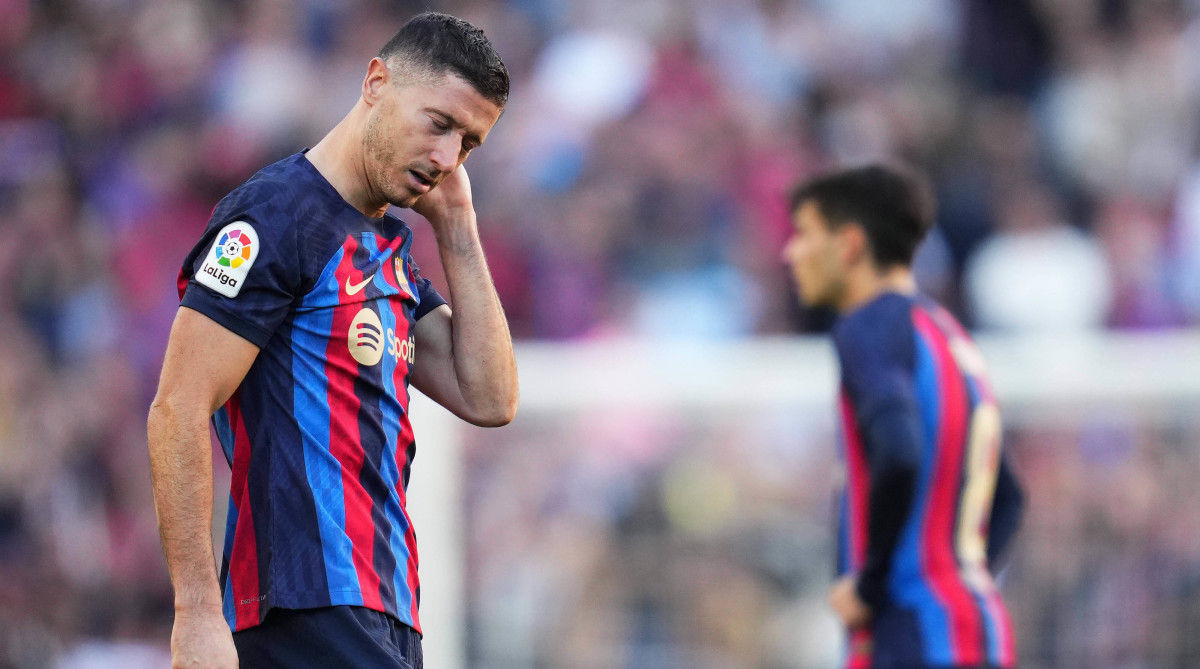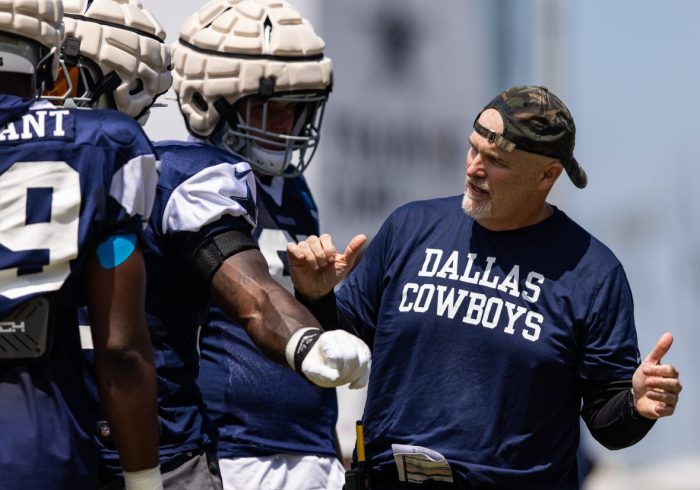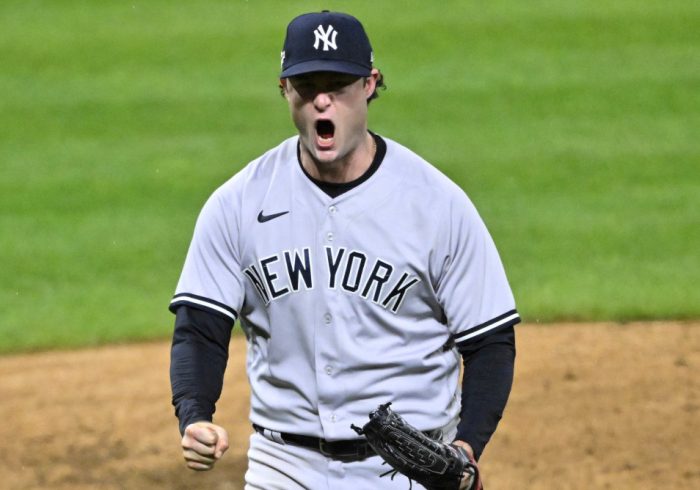There was a certain sense of inevitability that hung in the air at the Camp Nou. Bayern Munich winger Sadio Mané scored the opener in the ninth minute and hardly celebrated. A second went in in the 31st minute and all was already lost. The 84,000 supporters had seen this script play out before: Mighty FC Barcelona was simply not good enough against the German club.
That didn’t stop the jeers from raining down at full time of Barca’s 3–0 loss, and it certainly didn’t ease the sting of what was a defeat of massive importance. Barcelona was out of the Champions League before the knockout stage in a season it needed to reach it more than any other.
A summer of financial calamity and future profits auctioned off for current cash was planned on the idea the club would make a UCL run. It didn’t, and so all eyes on the club turned to La Liga, which it hasn’t won since 2018-19.
“La Liga tops our priorities,” Xavi told Barca TV in December. “We have the [Spanish] Supercopa in January and the Copa del Rey and the Europa League coming up too, but the league marks the season.”
But as it restarts its season after the winter World Cup, this Barcelona side doesn’t quite yet have the feel of a league-winning club. It doesn’t need to be the dominant side that won eight of 11 league titles from 2009 to ‘19 (and it certainly isn’t). But the future financial health of the Catalan club hinged on two things from this season: Reaching the Champions League last 16 and winning La Liga. The first dream has already been dashed, and the club will have to settle for trying to grab a Europa League consolation prize. The second won’t be possible without the club’s exorbitant summer spending spree paying off.
The offseason spending has largely helped the club’s on-field product. Robert Lewandowski, to nobody’s surprise, is still scoring with the machine-like precision that has earned him a reputation as a robotic attacking force. The former Bayern Munich striker who tore up the German Bundesliga for a decade has transitioned rapidly to La Liga. His 13 goals are more than anyone in Europe’s top five leagues aside from fellow cyborgs Erling Haaland (21) and Harry Kane (15). He has improved the focus and flow of a Barcelona attack that struggled at times last year.
Lewandowski has hit the ground running, and Barcelona will need every bit of his goalscoring prowess.
Sergio Ruiz/Pressinphoto/IMAGO
The other two big-money moves have also had their moments in the spotlight without truly recapturing the form that led them to the eastern Spanish coast. Raphinha, in from Leeds for $61 million, has put out just two goals and two assists in La Liga this season. The winger’s fit alongside an ascending Ousmane Dembélé is still not entirely clear. Defender Jules Koundé ($53 million) has been strong at his preferred center back spot, which leaves somewhat of a question mark at right back, where he played for the first half of the season.
The good news: It’s absolutely not all doom and gloom for the Blaugrana, even if much of the outside noise (and the first half of this article) says otherwise. No team in Europe’s top five leagues has a better expected goal (xG) differential this season. The only games in which it didn’t lead the xG stakes were wins over defensive-minded Mallorca and Osasuna. The magic of the Pep Guardiola, Cruyffian-style, prime Barcelona tiki-taka isn’t always there, but Xavi has made sure his side has kept majority possession in every game it has played this year.
The issue with the team’s current financial setup is that while other contenders (namely arch nemesis Real Madrid) can retool a little during the January transfer window, reinforcements aren’t imminent for Barcelona. La Liga altered its financial fair play rules in November, limiting the number of additional financial levers the club could pull to mortgage future profits for current ones.
“The president [Joan Laporta] has been clear we are in a difficult situation, almost impossible, so talking about reinforcements makes no sense at the moment,” said sporting director Jordi Cruyff, per the Athletic. “Although we will see if we are able to do something when the market opens.”
So that leaves this year’s La Liga likely down to the two-horse race that dominated the better part of the last two decades. Barcelona and Real Madrid, Blaugrana and Blancos, titans of the sport (and European Super League truthers), sit in a deadlock at the top of the league heading into the weekend’s fixtures.
Barcelona’s cross-country rivals are in excellent form. Karim Benzema missed several weeks in October and Madrid hardly missed a beat. Winger Vinícius Jr. is coming into his own as a superstar. Midfielders Aurélien Tchouaméni, Fede Valverde and Eduardo Camavinga look like the future after the brilliant Luka Modrić finally loses his powers, if that happens within the century. The reigning champions have picked up more points per contest so far than they did in last year’s runaway title-winning season.
Meanwhile Real Sociedad, which hasn’t finished in the top three in two decades, has started the season brightly. La Real sits in third (nine points off first) and will be bolstered by the return of striker Mikel Oyazarbal, who is slowly being worked back into the lineup. He tallied double-digit goals in four straight seasons before rupturing his ACL last March.
Then looms Atlético Madrid in fourth. Trouble has been brewing for some time with the 2020-21 league champions. Young star João Félix made clear his displeasure with manager Diego Simeone and the club, and the club has made clear its willingness to let the $126 million transfer go. Simeone himself isn’t too popular at the moment. His uber-defensive counterattacking style isn’t enjoyable when it doesn’t work (and oftentimes not even when it does). It wasn’t working for much of the season’s opening stage, and Atleti sits in fourth and 11 points behind the league leaders.
And there awaits Barcelona’s next big test at the Estadio Wanda Metropolitano on Sunday. Two teams in flux, in dire need of a title charge this season. Atléti, too, missed out on the UCL knockout stage. For the Blaugrana, their status as one of the European giants may be in dire straits unless they can start picking up results against the continent’s top teams—their four losses this season are against Bayern Munich, Inter Milan, Real Madrid and Bayern Munich again. A win against Simeone’s side—especially without Lewandowski, who is serving a three-match suspension—would show this club is indeed capable of salvaging some of the financial burden this season will incur.
The future has already been mortgaged. The rest of the La Liga season is Barcelona’s chance to save it.



